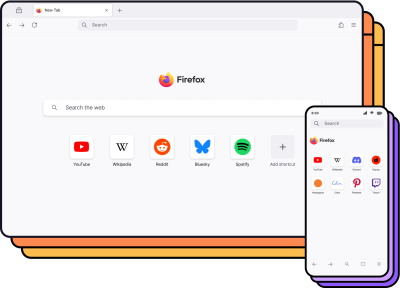Mozilla Firefox Integrates Perplexity AI, Ushering in a New Era of Conversational Search
By: @devadigax

Mozilla Firefox, a long-standing champion of user privacy and an open web, has taken a significant leap into the future of information retrieval by integrating Perplexity AI as a new, optional search engine. This groundbreaking move positions Firefox at the forefront of the evolving digital landscape, offering users a distinctly different way to interact with the internet: through conversational, cited answers rather than the traditional deluge of links. This strategic enhancement is poised to redefine user expectations for browser-based search, moving beyond simple keyword matching to intelligent, synthesized responses.
The integration is not merely an incremental update; it represents a philosophical shift in how Firefox aims to deliver information. Instead of presenting a list of blue links that require users to navigate through various websites to piece together an answer, Perplexity AI provides direct, concise, and context-rich responses. Crucially, these answers are thoroughly cited, allowing users to verify the information and delve deeper into source material if desired. This blend of generative AI convenience and academic rigor addresses a key concern often raised about AI-generated content: its trustworthiness and transparency.
For the average Firefox user, this translates into a dramatically streamlined search experience. Imagine asking a complex question and receiving an immediate, articulate summary, complete with links to the original articles, research papers, or news reports that informed the AI's response. This eliminates the often tedious process of sifting through multiple search results, clicking on promising links, and then extracting the relevant bits of information. In an age where instant gratification and efficiency are paramount, Perplexity AI within Firefox promises to deliver on both fronts, saving users precious time and cognitive load.
Mozilla’s decision to partner with Perplexity AI comes after successful preliminary tests in select markets, where user feedback proved overwhelmingly positive. This positive reception underscores a growing appetite among internet users for more intelligent and direct forms of information access. It suggests that while traditional search engines remain vital, there's a clear demand for augmented capabilities that leverage the power of artificial intelligence to provide immediate, actionable insights. This initial success bodes well for the broader rollout and adoption of this new search paradigm within Firefox.
Perplexity AI, often dubbed an "answer engine," distinguishes itself from conventional search engines by focusing on generating real-time, accurate summaries of information from across the web. Unlike large language models that might sometimes "hallucinate" or provide outdated information, Perplexity is designed to ground its answers in verifiable sources, presenting these sources alongside its generated text. This commitment to verifiability aligns well with Mozilla's long-standing dedication to an open, transparent, and trustworthy internet, making the partnership a natural fit despite their differing technological approaches.
This integration also places Firefox firmly in the ongoing "AI browser wars." Competitors like Google Chrome, with its Search Generative Experience (SGE), and Microsoft Edge, powered by Copilot (formerly Bing Chat), have already begun incorporating AI directly into their search and browsing functionalities. By bringing Perplexity AI onboard, Firefox ensures it remains competitive and offers its users access to cutting-edge AI tools, preventing a potential exodus to browsers perceived as more technologically advanced. This move is not just about adding a feature; it's about staying relevant and innovative in a rapidly evolving digital ecosystem.
The implications for the broader AI industry are also significant. It signals a growing trend of specialized AI tools finding their way into mainstream applications, moving beyond niche use cases to become integral parts of daily digital life. As AI models become more sophisticated and efficient, we can expect to see further integrations of "answer engines" and other AI-powered tools directly into operating systems, browsers, and productivity suites. This decentralization of AI capabilities empowers users with choice and fosters a more diverse ecosystem of AI services, rather than a single dominant player.
Looking ahead, the collaboration between Firefox and Perplexity AI is set to expand its reach. The raw description indicates that Perplexity’s capabilities will soon extend to mobile platforms, promising a consistent, AI-enhanced search experience across devices for Firefox users. This mobile expansion is critical, given the increasing prevalence of smartphone-based internet access and the demand for seamless cross-device functionality. Future developments could see deeper integration of AI beyond just search, potentially assisting with content creation, summarization of web pages, or even proactive information delivery based on browsing context.
While the benefits are clear, the integration also opens discussions around the ethical considerations of AI in search. Questions around the potential for bias in AI-generated answers, the economic impact on content creators whose websites might see reduced traffic if users get direct answers, and the energy consumption of running complex AI models will continue to be important considerations. However, by offering Perplexity AI as an *option* rather than a forced default, Firefox empowers users to choose their preferred search method, upholding its commitment to user control and customization
The integration is not merely an incremental update; it represents a philosophical shift in how Firefox aims to deliver information. Instead of presenting a list of blue links that require users to navigate through various websites to piece together an answer, Perplexity AI provides direct, concise, and context-rich responses. Crucially, these answers are thoroughly cited, allowing users to verify the information and delve deeper into source material if desired. This blend of generative AI convenience and academic rigor addresses a key concern often raised about AI-generated content: its trustworthiness and transparency.
For the average Firefox user, this translates into a dramatically streamlined search experience. Imagine asking a complex question and receiving an immediate, articulate summary, complete with links to the original articles, research papers, or news reports that informed the AI's response. This eliminates the often tedious process of sifting through multiple search results, clicking on promising links, and then extracting the relevant bits of information. In an age where instant gratification and efficiency are paramount, Perplexity AI within Firefox promises to deliver on both fronts, saving users precious time and cognitive load.
Mozilla’s decision to partner with Perplexity AI comes after successful preliminary tests in select markets, where user feedback proved overwhelmingly positive. This positive reception underscores a growing appetite among internet users for more intelligent and direct forms of information access. It suggests that while traditional search engines remain vital, there's a clear demand for augmented capabilities that leverage the power of artificial intelligence to provide immediate, actionable insights. This initial success bodes well for the broader rollout and adoption of this new search paradigm within Firefox.
Perplexity AI, often dubbed an "answer engine," distinguishes itself from conventional search engines by focusing on generating real-time, accurate summaries of information from across the web. Unlike large language models that might sometimes "hallucinate" or provide outdated information, Perplexity is designed to ground its answers in verifiable sources, presenting these sources alongside its generated text. This commitment to verifiability aligns well with Mozilla's long-standing dedication to an open, transparent, and trustworthy internet, making the partnership a natural fit despite their differing technological approaches.
This integration also places Firefox firmly in the ongoing "AI browser wars." Competitors like Google Chrome, with its Search Generative Experience (SGE), and Microsoft Edge, powered by Copilot (formerly Bing Chat), have already begun incorporating AI directly into their search and browsing functionalities. By bringing Perplexity AI onboard, Firefox ensures it remains competitive and offers its users access to cutting-edge AI tools, preventing a potential exodus to browsers perceived as more technologically advanced. This move is not just about adding a feature; it's about staying relevant and innovative in a rapidly evolving digital ecosystem.
The implications for the broader AI industry are also significant. It signals a growing trend of specialized AI tools finding their way into mainstream applications, moving beyond niche use cases to become integral parts of daily digital life. As AI models become more sophisticated and efficient, we can expect to see further integrations of "answer engines" and other AI-powered tools directly into operating systems, browsers, and productivity suites. This decentralization of AI capabilities empowers users with choice and fosters a more diverse ecosystem of AI services, rather than a single dominant player.
Looking ahead, the collaboration between Firefox and Perplexity AI is set to expand its reach. The raw description indicates that Perplexity’s capabilities will soon extend to mobile platforms, promising a consistent, AI-enhanced search experience across devices for Firefox users. This mobile expansion is critical, given the increasing prevalence of smartphone-based internet access and the demand for seamless cross-device functionality. Future developments could see deeper integration of AI beyond just search, potentially assisting with content creation, summarization of web pages, or even proactive information delivery based on browsing context.
While the benefits are clear, the integration also opens discussions around the ethical considerations of AI in search. Questions around the potential for bias in AI-generated answers, the economic impact on content creators whose websites might see reduced traffic if users get direct answers, and the energy consumption of running complex AI models will continue to be important considerations. However, by offering Perplexity AI as an *option* rather than a forced default, Firefox empowers users to choose their preferred search method, upholding its commitment to user control and customization
Comments
Related News

OpenAI Unveils ChatGPT Atlas: Your Browser Just Became Your Smartest AI Assistant
In a move poised to fundamentally reshape how we interact with the internet, OpenAI has officially launched ChatGPT Atlas, a gr...
@devadigax | 22 Oct 2025
In a move poised to fundamentally reshape how we interact with the internet, OpenAI has officially launched ChatGPT Atlas, a gr...
@devadigax | 22 Oct 2025

Netflix Doubles Down on Generative AI, Challenging Hollywood's Divide Over Creative Futures
In a move that underscores a growing chasm within the entertainment industry, streaming giant Netflix is reportedly going "all ...
@devadigax | 21 Oct 2025
In a move that underscores a growing chasm within the entertainment industry, streaming giant Netflix is reportedly going "all ...
@devadigax | 21 Oct 2025

AI Agent Pioneer LangChain Achieves Unicorn Status with $1.25 Billion Valuation
LangChain, the innovative open-source framework at the forefront of building AI agents, has officially joined the exclusive clu...
@devadigax | 21 Oct 2025
LangChain, the innovative open-source framework at the forefront of building AI agents, has officially joined the exclusive clu...
@devadigax | 21 Oct 2025

Meta Boots ChatGPT From WhatsApp: A Strategic Play for AI Dominance and Walled Gardens
In a significant move that reshapes the landscape of AI chatbot accessibility, OpenAI has officially confirmed that its popular...
@devadigax | 21 Oct 2025
In a significant move that reshapes the landscape of AI chatbot accessibility, OpenAI has officially confirmed that its popular...
@devadigax | 21 Oct 2025

Meta's New AI Peeks Into Your Camera Roll: The 'Shareworthy' Feature Raises Privacy Eyebrows
Meta, the parent company of Facebook, has rolled out a new, somewhat controversial artificial intelligence feature to its users...
@devadigax | 18 Oct 2025
Meta, the parent company of Facebook, has rolled out a new, somewhat controversial artificial intelligence feature to its users...
@devadigax | 18 Oct 2025
 AI Tool Buzz
AI Tool Buzz